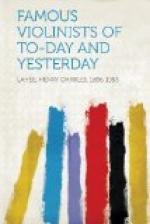Another authority tells us, in less flowery language, that he was of herculean frame and very strong constitution.
In 1807 he made a tour, with his wife, through Germany, and while at Munich the king showed his gallantry to Madame Spohr in a most gracious manner. The usher had neglected to place a chair on the platform for her, and the king handed up his own gilded throne chair, in spite of her protestations. The anecdote would be more satisfactory if it stated what the king sat upon during the concert, but that is left to the imagination. The king had some bad habits, and, we are told, was very fond of playing cards during the concerts. Spohr was not accustomed to having his audiences indulge in cards, and so informed the chamberlain, absolutely declining to play unless the cards were put aside for the time being. It was a delicate task that fell to the lot of the chamberlain, but he carried it through with the greatest diplomacy, each side making a slight concession: the king on his part promising to abstain from card playing during Spohr’s performance on condition that the violinist’s two pieces should immediately follow each other on the program, and Spohr withdrawing his embargo from the whole concert on condition that the king would abstain from his favourite amusement during his particular performance. The king, however, seems to have put in the last blow, for on the conclusion of the violin solos he gave no signal for applause, and as it would be a breach of court manners for any one to applaud without his Majesty’s consent, the artist was obliged to make his bow and retire amidst deathly silence.
In 1808 Spohr wrote his first opera, but although it was accepted for representation, it was never performed in public.
During this year Napoleon held his celebrated congress of princes at Erfurt. Spohr was consumed by a burning desire to behold Napoleon and the surrounding princes, and went to Erfurt. Here he found that a French theatrical troupe was performing every evening before the august assembly, but only the privileged few could by any possibility gain admittance to the theatre. Spohr’s ingenuity was equal to the emergency, and making friends with the second horn player, he induced that artist to allow him to substitute for him one night. Spohr had never in his life attempted to play the horn, but it was now necessary for him to acquire the art before night, and he set to work with such vim that by the time of the performance his lips were swollen and black, but he was able to produce the requisite tones. The orchestra having received strict injunctions to sit with their backs to the brilliant assembly, probably to protect their eyesight from its dazzling effects, Spohr fitted himself out with a small mirror, and placing this upon his music-rack, he was able to enjoy for a couple of hours the vision of the great Napoleon, who, with his most distinguished guests, occupied the front row of the stalls.




